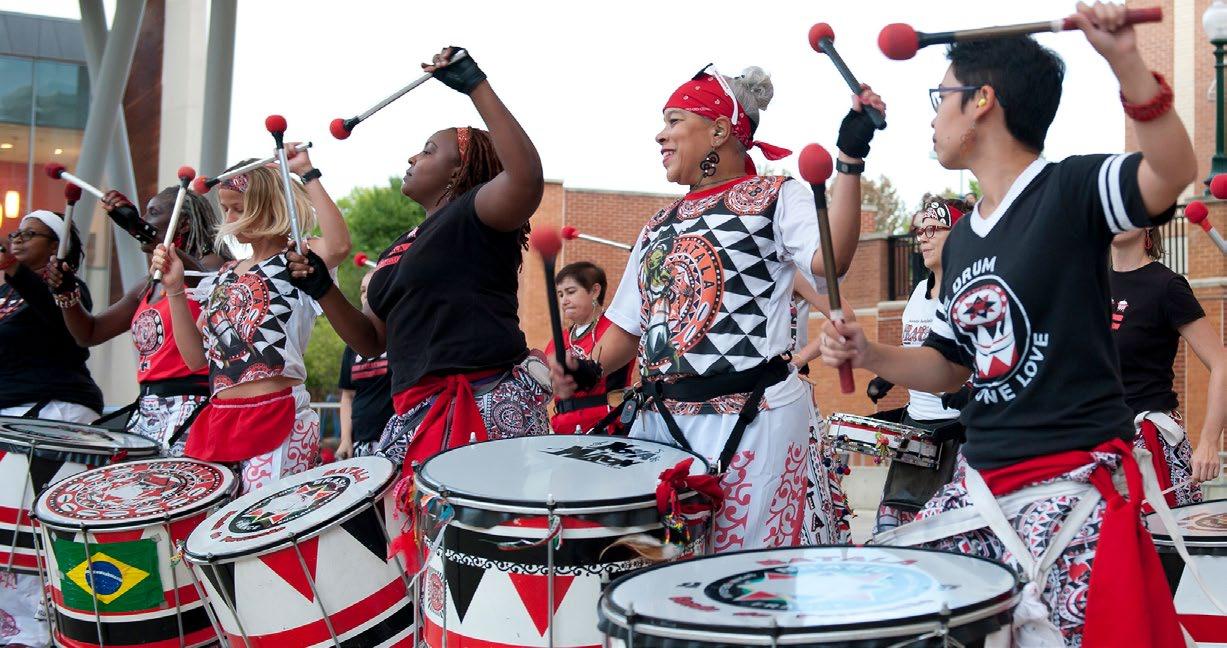How we build belonging

Envisioning a just world in which we each belong, prosper, and thrive in the place we now call home, no matter where we came from.
2022 ANNUAL REPORT


Envisioning a just world in which we each belong, prosper, and thrive in the place we now call home, no matter where we came from.
2022 ANNUAL REPORT

The start of 2022 was marked by Russia’s invasion of Ukraine, prompting the displacement of millions of people. We saw the capacity of communities to welcome with resilience — a theme that was underscored again as communities continued to support Afghan arrivals, asylum seekers sent by bus from the U.S. southern border, and many others seeking safety and opportunity. At the same, this abundant welcoming spirit stood in contrast to narratives and policies rooted in an inequitable hierarchy of welcome that far too often makes factors of identity — race, class, origin, religion, and more — the basis for belonging, rather than our shared humanity.
It has never been more evident that our capacity to flourish depends on casting off these vestiges of racism, colonialism, and our propensity to demonize the “other,” and embracing a future in which our collective potential finds its basis in our inherent dignity and worth, and in the capacity of communities to be abundant in their welcome. As you’ll read about in this report, this is a challenge that the welcoming movement is confronting head-on.
As mass migration prompted by climate change looms, we cannot afford to solve humanity’s greatest challenge by drawing up the gates and enclosing ourselves in fortresses, especially ones that segregate our societies and limit our potential. Instead, we need to reimagine a future where we can live and thrive together at our greatest potential, regardless of birthplace, and build welcoming infrastructure that expands the capacity of communities to adapt to demographic shifts with abundance and equity as north stars.
As Mahatma Gandhi famously said, “The difference between what we do and what we are capable of doing would suffice to solve most of the world’s problems.” Today, welcoming communities across the U.S. and globe are doing just that — demonstrating just what we are capable of. This report and our work at Welcoming America is a tribute to their leadership, and to the power of the growing welcoming movement. Together, we are not only building a more just, inclusive world but imagining that such a thing can be possible, and how we can all share in its potential.
Rachel Perić Executive Director, Welcoming America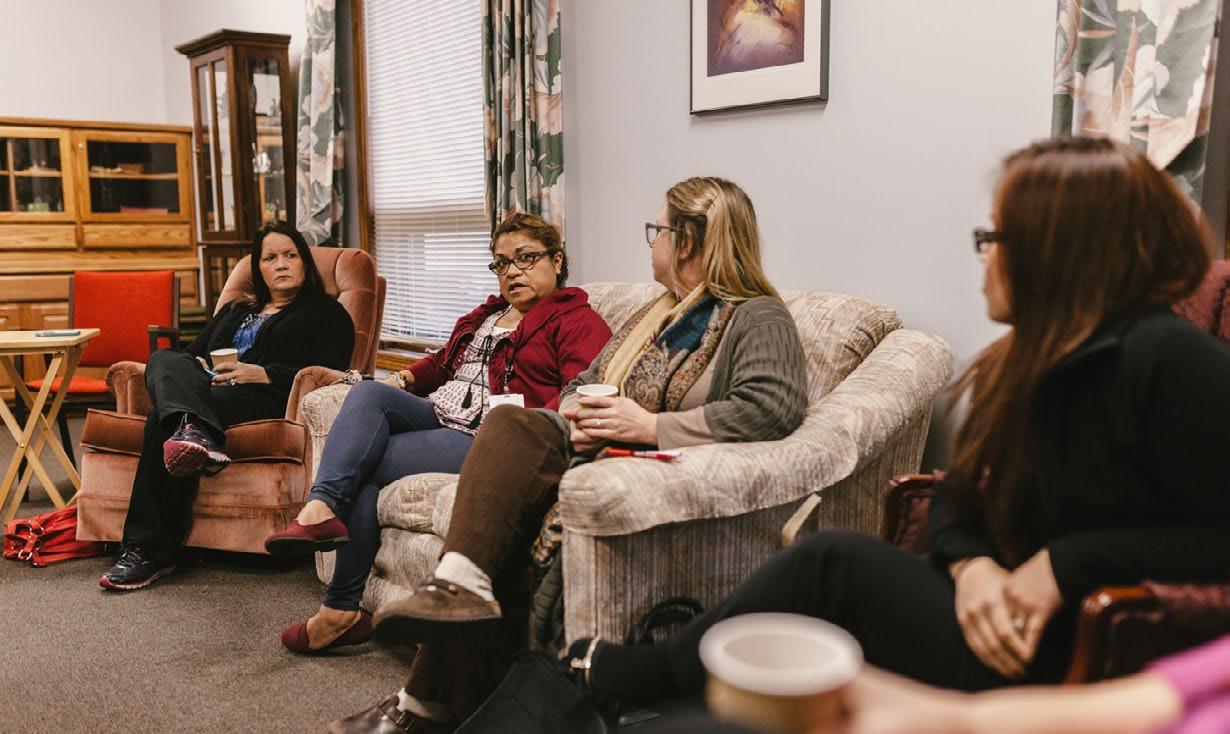
In local communities and at the broadest level, welcoming is the long-haul work of creating successful, multiracial democracies in which every person belongs. To us, welcoming is both a verb and an adjective — the “how” and the “what” of our work.
In 2022, we launched a strategic plan to guide our work for the next four years. We’re working to achieve three key goals:
Building local welcoming infrastructure: Certify a total of 50 diverse archetypal places as welcoming, demonstrating measurable progress in building public and multisector infrastructure for immigrant equity at the local level.
Growing the field of welcoming: Create a bigger and more organized field of practice that positions communities to achieve the Welcoming Standard.
Engaging new champions: Create access points for new champions to offer their time, resources, and voices.
By 2026, Welcoming America will help address systemic discrimination and disparities encountered by immigrants by advancing a strong foundation of welcoming in local communities.
Grew our network to 287 NATIONAL MEMBERS
Expanded the Welcoming International Alliance to 6 GLOBAL PARTNERS:
Celebrated 10 YEARS OF WELCOMING WEEK with the theme “Where We Belong”
Reached milestone of 17 CERTIFIED WELCOMING COMMUNITIES , putting us on track to certifying 50 places

GATHERED OVER 450 PARTICIPANTS to learn and share best practices with peers at the 2022 Welcoming Interactive

OVER 3,300 GLOBAL PARTICIPANTS in 75+ hours of Welcoming America events, webinars, and training programs
Welcoming is a core American value, but also a global one. Around the world, leaders are rethinking what it means to welcome those seeking safety or new opportunities to the places they call home. While one prevailing narrative may suggest that nations are becoming more insular, our work shows that welcoming is a value shared by many, no matter where in the world we are.
Canada: Immigration, Refugees, Citizenship Canada
80 MEMBERS
United States: Welcoming America
287 MEMBERS
United Kingdom: Inclusive Cities (University of Oxford Centre on Migration, Policy & Society)
12 MEMBERS
Among our partners and members in 2022, we know that over 500 local governments and NGOs worldwide are implementing welcoming policies and practices in their communities. This is a snapshot of the growing global movement of welcoming led by our Welcoming Network members and Welcoming International Alliance partners.
Germany: Bertelsmann Stiftung
35 MEMBERS
Over 500 local governments and NGOs worldwide are implementing welcoming policies and practices in their communities
Australia: Welcoming Australia
72 MEMBERS
New Zealand: Welcoming Communities (Immigration New Zealand)
27 MEMBERS
Note: Figures are based on membership in 2022.
Welcoming America supports communities that are building local welcoming infrastructure with programs that enhance local capacity and strengthen multisector partnerships.
How do communities create equitable and inclusive infrastructure? Building welcoming infrastructure requires collaborative agenda setting, policies, and practices across government and the community that advance belonging and civic, social, and economic participation.
Our Welcoming Standard is a comprehensive roadmap for welcoming infrastructure in the United States. In 2022, we laid the groundwork for a new Welcoming Standard, and we look forward to seeing how the updates will continue to transform communities in 2023 and beyond.
Many places call themselves welcoming, but how can they truly demonstrate how equity and inclusion work are happening in their community? Certified Welcoming is our answer.
The Certified Welcoming program makes the value of welcoming concrete. By using the Welcoming Standard to develop welcoming infrastructure, communities that become Certified Welcoming exemplify the practices and policies that cultivate belonging among immigrants and refugees.
73% of Certified Welcoming places have improved language access in their local government.
41% have created or improved local government processes to regularly assess the needs and priorities of the local immigrant community
55% of certified local governments have begun providing training for public safety staff on working with diverse populations
Following our commitment in 2021 to update the Welcoming Standard, we dedicated time and resources to revamping the Welcoming Standard and Certified Welcoming program this year. This involved:
Analyzing thousands of comments from partners and the public on ways to reflect current best practices in the Welcoming Standard, Piloting the new Certified Welcoming process and criteria in three communities, and Redesigning the program to create a clearer path for places to get started on their welcoming journey through a star designation system.
On the road to certifying 50 diverse Certified Welcoming places by 2026, we used our strategic plan to state our ongoing commitment to intentionally working with a broad range of communities — urban and rural, small and large, geographically and demographically diverse — that represent the variety of places where newcomers make their home when they come to the United States.
Being Certified Welcoming strengthens and affirms [the welcoming work] you’re doing. It is a very rigorous process because someone else was evaluating us, telling us what we were doing well and what could be improved. The Certified Welcoming process puts a name towards that work.
—Jeannette Horwitz, Program Coordinator, City of Dayton, Ohio (Certified Welcoming since 2017)
Maintaining the status of Certified Welcoming requires localities to go through a recertification process to ensure compliance with the Welcoming Standard. The Louisville Metro Government in Kentucky became Certified Welcoming in 2018 and recertified in 2022. Over the last decade, Louisville’s immigrant population has grown rapidly. To Amos Izerimana, director of Louisville’s Office for Immigrant Affairs, Certified Welcoming is an important distinction for the city because it demonstrates the community’s long-term efforts and pride in being an inclusive, welcoming community for newcomers. The recertification process offered an opportunity for the local government to reflect on how partnerships help the city engage with immigrant and refugee communities.

This year we certified 6 new communities and recertified 3 places, raising the total number of Certified Welcoming places to 17.
NEW CERTIFICATIONS

• Charlotte, North Carolina
• Detroit, Michigan
• Nashua, New Hampshire
• Portland, Maine
• San José, California
• Toledo, Ohio
RECERTIFICATIONS
• Lancaster, Pennsylvania
• Louisville, Kentucky
• Salt Lake County, Utah
To view a full list of Certified Welcoming places, visit CertifiedWelcoming.org
Our Welcoming Network members represent nearly 300 communities in 46 U.S. states. Each of our members is leading the important work of transforming their communities to be more inclusive, welcoming places for immigrants and non-immigrants alike.
To welcome immigrants and refugees to Akron, the International Institute of Akron offers a variety of services, from education to employment and legal services. Language interpretation and translation services are a critical resource the organization offers their community.
Bhim P. Dhungana is a core certified healthcare interpreter and works as an interpreting coordinator at the International Institute of Akron. He has been an active participant in Welcoming America’s language access workshops for several years.

“I want to be up to date with the latest rules and regulations affecting this profession,” he shares. “By obtaining knowledge from this workshop, I am educating myself as well as I am able to guide other contractor interpreters who are working with our agency to the better direction and help them to learn more about this field.”
In 2022, we offered two series of language access workshops to Welcoming Network members in partnership with Global Wordsmiths. Through 12 virtual workshops, over 60 participants gained fundamental tools and resources to create more effective and equitable language access policies and procedures.
Silos, both structural and interpersonal, prevent true belonging. Thanks to funding from the Walmart Foundation and others, we launched a new program — the Belonging Learning Lab — to equip leaders with the skills to tear down those silos in their communities.
Through peer learning and guest presenters from the field, 65 Welcoming Network members strengthened their understanding of contact theory, learned techniques to engage in difficult conversations, and walked away with practical methods to build bridges between groups that otherwise might not work together.
One participant described the impact of the program: “One of the thing[s] that the learning lab did for me was to help me stay inspired… and to keep thinking beyond the bridge that we are building in our community. Every month
was a new topic and hearing other members sharing resources…has been continuously very helpful.”
Participants were encouraged to utilize what they learned to engage residents in “do-ittogether” activities that build bridges between different groups in their community. Another participant reflected, “ The Learning Lab equipped me with ways to connect individuals to their history and provided a positive approach to having difficult conversations It was beneficial as it taught us how to work together with diverse populations.”
The peer learners enjoyed the four sessions so much that they requested additional time to meet to take their conversations to a deeper level and continue to network with each other.
In May 2022, the Certified Welcoming City of San José was among 40+ local governments from around the world that delivered actions at the United Nations during the first International Migration Review Forum in New York City. Welcoming America staff worked with our member, the San José Office of Racial Equity, to submit a pledge to the Global Compact on Refugees that secured them an invitation to the forum.
San José became the second city in the United States to sign a pledge to the Global Compact on Refugees. The pledge complements the Welcoming San José Plan which outlines actions to establish equitable systems, improve access to services, advance educational and
economic opportunities, and foster trust and communication in the local community. These efforts drew the attention of the U.N. High Commissioner for Refugees, Filippo Grandi. Later in the year, Grandi visited San José to learn about local refugee support efforts from city staff, partner organizations, and local former refugees.
He expressed, “Cities play a critical role in facilitating civic, economic, and social inclusion for refugees . The City of San José is a great example, showing leadership and working to ensure those who are forced to flee their homes have support and opportunities to reach their fullest potential.”
Between August 2021 and September 2022, approximately 88,500 Afghan refugees arrived in communities across the United States.
In response, Welcoming America partnered with Open Society Foundations to co-lead a grant program to support 12 communities across the U.S. in welcoming Afghan arrivals. The grantees participated in a community of practice where they could share challenges and troubleshoot with a cohort of local leaders working to build collaborative welcoming infrastructure.
Over the last few years, over 1,800 Afghan asylum seekers arrived in Michigan. The Office of Global Michigan was awarded a grant through our program
to coordinate pro bono outreach, support interpretation services, and provide a network of legal service providers to support Afghan refugees.
“As we learned early on of the need for asylum application supports, we wanted to ensure a coordinated statewide process for legal service providers and partners,” says Ben Cabanaw, deputy director of the Office of Global Michigan. “One thing I have been excited about is the connection and further collaboration we have created with a network of legal service providers. We hope that given the many needs across additional populations arriving to Michigan, we have created a replicable standard in response.”
Local government leaders are playing a critical role in welcoming Afghans and helping them to settle into new communities. We are proud to stand shoulder to shoulder with them in welcoming these newcomers. In making these grants and others like it we recognize that partnerships between local governments and community groups are essential in building inclusive communities and are contributing to a growing movement of ‘welcome’ across the country.”
— Laleh Ispahani, co-director of Open Society-U.SAs local communities prepare to welcome refugees displaced by war, conflict, and climate disasters, creating the long-term infrastructure needed to support and engage migrants and non-migrants will ensure that everyone belongs and thrives in these communities. Published in late 2022, this tool outlines five approaches to creating equitable welcoming infrastructure for humanitarian relief.

2022 was a year of reimagining how welcomers can work together, taking what we learned from the COVID-19 pandemic to our in-person gatherings where we celebrated and advanced a global narrative of welcoming.
Every year, we strive to create a bigger and more organized field of welcoming practice. Growing the field of welcoming means we are continually learning, collaborating, refining, and communicating what it means to be welcoming and who is building a more welcoming society. Developing more strategic partnerships and programs is expanding the number of our member communities who can achieve the Welcoming Standard.
Late in the year, the White House reestablished the Task Force on New Americans, which was the result of many years of advocacy and leadership from our partners and network. We are encouraged to see more immigrant equity infrastructure developing at all levels of government.
Sixteen people from our Welcoming International Alliance partners gathered virtually in early 2022 to discuss how programming can evolve to meet the needs of local members within each country. Leaders from the Alliance partner organizations came away with several key practices for virtual and hybrid engagement that they learned throughout the COVID-19 pandemic.
Later in the year, the group came together in person for the annual Welcoming International Alliance Convening at Welcoming America’s headquarters in Decatur, Georgia for discussions of good practice related to immigrant leadership, climate migration, and more. Alliance partners spent time networking with local officials and visiting local municipalities.
Both the U.S. and Italy experienced renewed efforts to welcome refugees migrating from Afghanistan and Ukraine in 2021 and 2022. How did local communities manage a welcome response?
Welcoming America organized the U.S.-Italy Welcoming Communities Exchange in cooperation with the International Rescue Committee and Refugees Welcome Italia and with support from the U.S. Mission to Italy. Fifty participants from
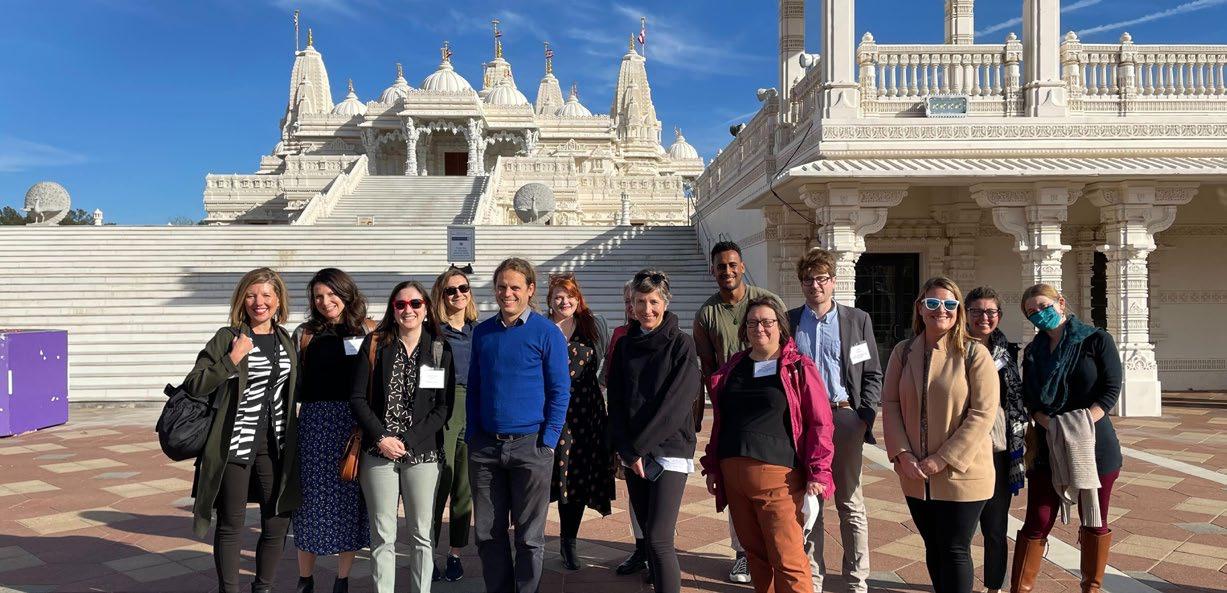
the U.S. and Italy discussed local examples, best practices, and suggestions for implementing a mentoring or community navigator model as part of welcoming strategies.
A participant reflected on the impact of the exchange, “We now have even more trusted resources of knowledge to keep improving the figure of mentors and their impact in migrant integration projects.”
Colleges and universities have the power to influence welcoming. Students from across town, across the country, and across the globe converge on college campuses, making vibrant and diverse micro-communities within a city or state. Institutions of higher education have an opportunity to welcome not only students, but refugees and other newcomers, to create more inclusive communities for all.
Every Campus A Refuge (ECAR) at Guilford College is modeling what’s possible when higher education’s influence and resources are used to support incoming refugees. ECAR at Guilford College, a member of the Welcoming Network, supports colleges and universities to partner with their local refugee resettlement agencies to house refugees on campus grounds and assist them in resettlement while transforming their students’ educational experiences.
With support from a $40,000 grant from Welcoming America’s Fund to Foster Belonging, ECAR hosted 200 participants at its first annual ECAR Gathering on Guilford College’s campus in September 2022. The conference focused on “do-it-together” activities between refugees and non-refugees and offered space for people to share challenges and experiences related to becoming refugee resettlement campuses.

The Gathering was co-designed by a stakeholder committee representing all of the groups who
attended: including folks from K-12 schools, higher education, refugee resettlement advocates and organizations, refugee community members, and more.
ECAR’s innovative model demonstrates how contact theory and intergroup bridging activities can bring together newcomers and long-time neighbors. A forthcoming manual from ECAR will share what they learned from bringing together higher education, refugee communities, and refugee resettlement organizations at the Gathering. The manual provides campus and community leaders with best practices and strategies to establish resettlement campuses.
In addition to ECAR, five other Fund to Foster Belonging grantees developed innovative projects that bring people from all walks of life together to foster belonging.
We hope this project will contribute to system change in how higher education supports refugee families and imagines its role as a central actor [and] integral stakeholder in the advancement of newcomers’ welcome, belonging, and inclusion.
— Diya Abdo, Ph.D., founder and director of Every Campus A Refuge
Every year, we are thrilled to bring welcomers across the country and globe together to share best practices at our conference, the Welcoming Interactive. In May 2022, over 450 people gathered in Charlotte, North Carolina — our first in-person Welcoming Interactive since 2019.

Sessions focused on topics including:
Language justice as a framework to ensure that people have the rights to language, culture, self-expression, and equal participation no matter which languages they speak
“Reclaiming Blackness in the Immigrant Experience,” drawing awareness to the importance of Black voices in decisionmaking spaces
Strategies for rural welcoming, featuring perspectives from U.S.-based members in Colorado and practitioners from Australia
Weaving arts into welcoming efforts to build community
The growing need to consider climate migration in conversations about immigrant equity and inclusion
Participants of our global Rural Communities Welcoming Exchange program came together to learn from each other at the Welcoming Interactive. From Gunnison, Colorado, Ricardo Esqueda and Yazmin Molina (on the left) gave examples of community engagement efforts that increased COVID-19 vaccination uptake and local government responsiveness. Kylie Lee and Natalia Muszkat from Gladstone in Queensland, Australia (on the right) discussed their local government’s Indigenous reconciliation action plan and how efforts from Welcoming Cities Australia build upon it.

At the Welcoming Interactive, I see the uphill journey ahead of us more clearly but I also have a team to walk with, and that means the world. We must continue to be in-the-know (even on the hard stuff) and lean on one another in this work.
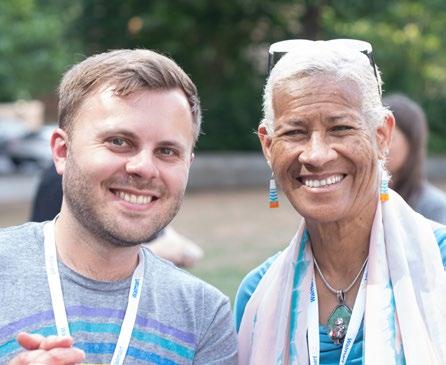
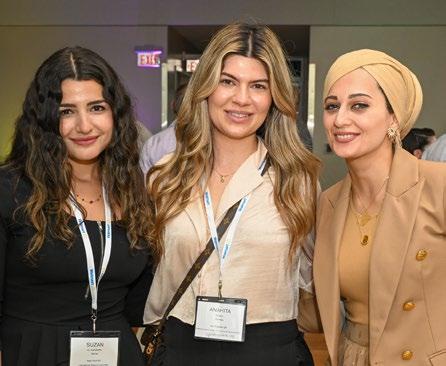
For over five years, Welcoming America and Global Detroit have worked together to support economic development opportunities created for and by immigrants. One core product of this partnership is the Welcoming Economies program.
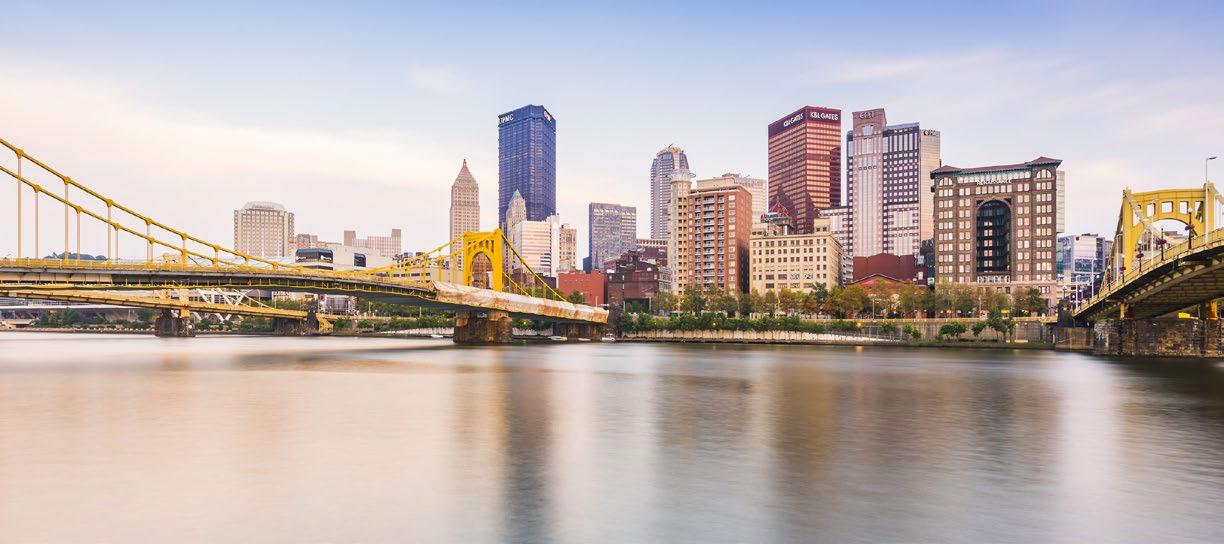
Through Welcoming Economies, our Welcoming Network members and their local economic development partners access skill-building resources, discussions with content area experts, and tailored coaching.
In 2022, Welcoming America hosted a series of eight webinars to showcase the impactful strategies, initiatives, and partnerships that support inclusive economic development in localities across the network. The Welcoming Economies webinars featured 23 guest speakers who spoke on topics ranging from workforce development for working-class immigrants to assisting immigrant women in economic inclusion. Over 200 participants engaged across 11.5 hours of inclusive economic development training.
BRIDGING LANGUAGE AND WORK:

SOLUTIONS TO INVEST IN IMMIGRANT AND REFUGEE TALENT
A collaboration between the Tent Partnership for Refugees and JFF (Jobs for the Future), this resource outlines how companies can implement solutions to overcome language barriers to help refugees and immigrants get into jobs faster as they work towards local language proficiency. Welcoming America shared insights and examples from the Welcoming Network and the Welcoming International Alliance with the report authors to inform the content.
To create a truly welcoming world, we need as many people in the movement as possible. To that end, Welcoming America is working to create access points for new champions to offer their time, resources, and voices.
Often, that means that we seek out individuals and organizations building welcoming in unexpected places. Rural towns and counties, local community foundations, and members of the local school board all can be leaders and have opportunities to demonstrate welcoming values in their work.
By making resources that are accessible, such as through Welcoming Week, we reach millions of people who have the potential to become welcomers.
For the past decade, Welcoming Week has taken root in communities through events, ceremonies, and other actions to commemorate the values that make places welcoming for all who live there. What started as just a handful of events in the U.S. has evolved into over 450 gatherings, webinars, and workshops held across 32 states and seven countries.
The 2022 theme “Where We Belong” aimed to go deeper and spark individual reflection on how and why belonging occurs, and ways we can break barriers so that places can foster belonging for all, including immigrants and
refugees. Thank you to the communities that hosted events and brought people of all backgrounds together to celebrate the places and spaces where we belong.
We’re thrilled to join Welcoming Week in its 10th year and expand this movement of communities where everyone can belong.
— Aleem Ali, CEO, Welcoming AustraliaWELCOMING WEEK 2022 BY THE NUMBERS:
OVER 450 EVENTS took place worldwide
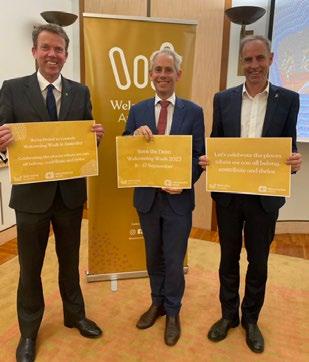
More than 6.5 MILLION PEOPLE REACHED on social media
At least 25 COMMUNITIES issued welcoming proclamations, resolutions, or messages


Reached communities in 7 COUNTRIES
ACROSS THE GLOBE, including Australia, Romania, Italy, and more
34 PARTNERS from nonprofits, private sector, universities, and beyond made Welcoming Week possible
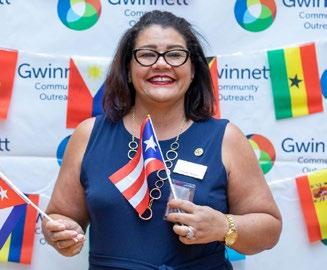
Schools and educational institutions are essential pillars of any community, but especially in places that consider themselves welcoming and inclusive.
In April 2022, Welcoming America partnered with fellow nonprofit organizations Faith Matters Network and Citizens University to host a retreat for school board members to discuss recent trends among school boards, address polarizing issues, and manage conflict.
With the support of the New Pluralists Collaborative, nine school board members from five states gathered with us in Asheville, North Carolina to connect with each other and learn how to continue this important work while sustaining themselves.

The ability to connect with people in similar roles in different states was a shared highlight among participants. “I made lasting, meaningful connections that will support and sustain my public service, and believe that I will maintain these relationships, both with the organizations and with the other school board members,” shared a school board member from North Carolina.
As school boards continue to face challenges in navigating partisan tensions and controversial topics, the retreat served as a reminder that community leaders are not alone in the broader struggle for democracy, pluralism, and ultimately, belonging for all.
How is community philanthropy currently engaging in welcoming work?

What are the opportunities for community foundations to be champions of local immigrant inclusion?
These are questions we pondered in 2022 as we invited over 20 community foundations to dialogue about what it means to advance welcoming priorities and build local welcoming infrastructure in their communities.
Community foundations from the interview stage of this project were invited to a special deep-dive session at the 2022 Welcoming Interactive. Ten leaders joined this gathering where they heard a concrete and inspiring example from
a Welcoming Network member about their work to further welcoming efforts in partnership with their local community foundation. The foundations also discussed the Welcoming Standard and its alignment with the U.N.’s Sustainable Development Goals. These insights inform a white paper released in 2023. We are grateful for support from The Charles Stewart Mott Foundation to engage community foundations as new champions of local welcoming work.
In 2022, as part of our ongoing Rural Welcoming Initiative, we selected 10 communities to receive support in building welcoming infrastructure. Participating communities received this support through monthly coaching calls, quarterly peer learning opportunities, and funding for Welcoming Week grants and travel to the Welcoming Interactive. Our 10 selected communities include:
West Central Initiative –Fergus Falls, Minnesota
Immigrant Allies (Committee of Humans
United for Equality) – Crawfordsville, Indiana
City of North Liberty, Iowa

YMCA at Virginia Tech – Blacksburg, Virginia
City of Gunnison, Colorado
Project FINE – Winona, Minnesota
City of Owatonna, Minnesota
Welcome BG – Bowling Green, Ohio
Town of Mansfield, Connecticut
Empowering Families –Scotts Bluff County, Nebraska
Carnegie Corporation of New York and other funders make it possible for us to continue supporting rural communities as welcoming leaders.
Published in partnership with the Center for Inclusion and Belonging at the American Immigration Council and the University of Massachusetts Amherst, this guide harnesses the lessons drawn from decades of research on how to foster a sense of trust and belonging between people from different backgrounds through community-based programs and initiatives. We hope this guide helps set the stage for building meaningful and sustained contact in communities across the United States.
Some of the most rapidly diversifying places in America are rural communities with populations under 50,000. We know a growing number of rural places are looking to formally start or continue advancing in their welcoming journey, which is why investing in these communities matters to us.

Local governments and nonprofits in our Welcoming Network are committed to building belonging in their communities across the U.S. Across the globe, our Welcoming International Alliance partners are advancing and expanding the work of welcoming with us.
ALABAMA
Alabama Coalition for Immigrant Justice ó
City of Huntsville Office of Diversity, Equity & Inclusion
ALASKA
Municipality of Anchorage
ARIZONA
Pima County Public Library ó
The Welcome to America Project ó
ARKANSAS
Northwest Arkansas Council ó
CALIFORNIA
Aztec Shops ó
Central Valley Immigrant Integration Collaborative (CVIIC) ó
City of Anaheim
City of Chula Vista
City of Daly City
City of LA Mayor’s Office of Immigrant Affairs
City of Redwood City
City of San Diego
City of San José
City of Sunnyvale
Coalition for Humane Immigrant Rights (CHIRLA) ó
Contra Costa County Employment & Human Services
County of San Mateo
County of San Diego –Health & Human Services Agency
Filoli ó
Pars Equality Center ó Santa Clara County (Office of Immigrant Relations)
YMCA of Greater Long Beach ó
YMCA of Metro LA ó
YMCA San Francisco ó
YMCA of San Diego County ó
COLORADO
City of Aurora
City of Denver Office of Immigrant & Refugee Affairs
City of Gunnison
Hispanic Affairs Project ó
Intercambio Uniting Communities ó
One Morgan County
Spring Institute for Intercultural Learning ó
YMCA of Metropolitan Denver ó
CONNECTICUT
Building One Community ó
City of Stamford
Hartford Public Library ó
International Hartford ó
Otis Library ó
Town of Mansfield
DISTRICT OF COLUMBIA
Many Languages One Voice (MLOV) ó
FLORIDA
Alachua County
City of Gainesville
First Coast YMCA ó
Jewish Community Services South Florida ó
Miami-Dade Office of New Americans ó
Rural Women’s Health Project ó
Weave Tales
Refugee Stories ó
GEORGIA
City of Atlanta Mayor’s Office of Immigrant Affairs/ Welcoming Atlanta
City of Brookhaven
City of Clarkston
City of Decatur
City of Doraville
City of East Point
City of Norcross
City of Stockbridge
CivicGeorgia ó
CDF Action ó
Clinica Medicos –Latino LinQ ó
Corners Outreach ó
Gwinnett County Government
Welcoming Avondale Estates
HAWAI‘I
Maui County Dept. of Housing & Human Concerns Immigrant Services Division
IDAHO
City of Boise
Idaho Office for Refugees at Jannus, Inc. ó
Unity Alliance of Southern Idaho ó
ILLINOIS
Champaign County Economic Development Corporation ó
City of Bloomington
City of Champaign
Syrian Community Network ó
The Immigration Project ó
YMCA of the University of Illinois ó
INDIANA
Amani Family Services, Inc. (Welcoming Ft. Wayne) ó
Center for Healing & Hope ó
City of Bloomington
City of Southbend
Immigrant Allies (Committee of Humans for Equality) ó
Immigrant Welcome Center ó
Johnson County Public Libraries, Adult Learning Center ó
Otis R Bowen Center for Human Services ó
Welcoming Michiana ó
IOWA
Centro Latino Iowa ó
City of Cedar Rapids
City of North Liberty
City of Sioux City
Johnson County
Marshalltown
YMCA-YWCA ó
One Siouxland ó
Tapestry Farms ó
West Des Moines Community Schools ó
KANSAS
Catholic Charities of Southwest Kansas ó
City of Dodge City
International Rescue Committee in Kansas ó
Johnson County/Johnson County Developments Support ó
Kansas Hispanic and Latino American Affairs Commission ó
Vibrant Health KC ó
Catholic Charities of Louisville ó
City of Bowling Green
City of Lexington (Global Lexington)
City of Louisville
Northern Kentucky Chamber ó
YMCA of Greater Louisville ó
LOUISIANA
Catholic Charities of New Orleans ó
City of New Orleans
Home is Here New Orleans ó
Louisiana Organization for Refugees and Immigrants (LORI) ó
MAINE
City of Portland
Office of Economic Opportunity
Community Organizing Alliance ó
Maine Technology Institute (MTI) ó
New England Arab American Organization (NEAAO) ó
YMCA of Southern Maine ó
MARYLAND
City of Baltimore Mayor’s Office of Immigrant Affairs
City of Salisbury
Montgomery County (Gilchrist Immigrant Resource Center)
Prince George’s County
Solutions in Hometown Connections ó
City of Boston Mayor’s Office for Immigrant Advancement
City of Cambridge
City of Salem
Old Colony YMCA ó
Re-Imagining Migration ó
YMCA of Greater Boston ó
Centro Multicultural La Familia ó
City of Battle Creek
City of Detroit Mayor’s Office of Immigrant Affairs & Economic Inclusion
City of Grand Rapids
City of Sterling Heights
City of Troy
Global Detroit ó
Immigrant & Refugee Resources
Collaborative ó
Kent County Administration (Welcoming Kent County)
Michigan Immigrant Rights Center ó
Oakland County Executive
Office of Global Michigan
Ottawa County ó
Washtenaw County
MINNESOTA
Arts Midwest ó
City of Austin
City of Minneapolis
City of Owatonna
City of Saint Paul
City of Saint Charles
City of Winona
Harold Mezile North Community YMCA ó
James H. Binger Center for New Americans, University of Minnesota Law School ó
Project FINE ó
Region Five Development Commission ó
Southeast Minnesota Together ó
Southern Minnesota Initiative Foundation ó
Southwest Initiative Foundation ó
#UniteCloud ó
Welcome Center, Austin ó
West Central Initiative ó
Worthington Area YMCA ó
YMCA of the North ó
Catholic Charities of Central and Northern Missouri ó
Greater Kansas City Chamber of Commerce
Interfaith Partnership of Greater St. Louis ó
International Institute of St. Louis ó
Kansas City Library Refugee & Immigrant Services & Empowerment ó
Literacy KC ó
Refugee and Immigrant Services and Education (RAISE) ó
St. Louis
Mosaic Project ó
Vitendo 4 Africa ó
YMCA of North Kansas City MO ó
NEBRASKA
Centro Hispano Comunitario de Nebraska ó
City of Crete
City of Lincoln
City of South Sioux City
Empowering Families ó
HOPE Esperanza ó
Lancaster County
Nebraska Appleseed ó
YMCA of Greater Omaha ó
NEVADA
Northern Nevada International Center ó
NEW HAMPSHIRE
City of Nashua
New Hampshire Alliance of Immigrants & Refugees / Welcoming
New Hampshire ó
Welcoming Concord (Second Start) ó
NEW JERSEY
Jersey City Division of Immigrant Affairs –Department of Health and Human Services
Metropolitan YMCA of the Oranges/Wayne ó
Municipality of Princeton
NEW MEXICO
La Plaza de Encuentro Gathering (Encuentro) ó
NEW YORK
African American Institute ó
Hearts and Homes for Refugees ó
International Institute of Buffalo ó
Ithaca Welcomes
Refugees ó
Of All Trades ó
RCC-ARA American Russian-Speaking Association for Civil & Human Rights ó
YMCA Of Greater New York ó
YMCA of Greater Rochester ó
NORTH CAROLINA
City of Charlotte
City of Durham
City of Greensboro
City of High Point
Episcopal Farmworker Ministry ó
Every Campus A Refuge at Guilford College ó
International House of Metrolina ó
Latino Community Development Center ó
Refugee Community Partnership ó
Town of Apex
Uniting NC ó
Universal Institute for Successful Aging of Carolinas ó
YMCA of Greater Charlotte ó
Bismarck Global Neighbors ó
City of Grand Forks
Global Friends Coalition ó
Cincinnati Compass ó
City of Akron
City of Columbus
City of Dayton
City of Toledo
Human Relations Commission
Cuyahoga County
Ebenezer Healthcare Access ó
Global Cleveland ó
International Institute of Akron ó
Lucas County
Norwood Together ó
RefugeeConnect ó
Summit County
Thrive Mahoning Valley ó
Toledo Lucas County
Public Library ó
Wave Pool ó
Welcome BG ó
YMCA of Central Ohio ó
City of Tulsa
YWCA Tulsa ó
City of Beaverton
City of Bend
City of Portland Office of Community & Civic Life
The Environmental Center ó
The Latino Community Association ó
Tualatin Hills Park & Recreation District ó
PENNSYLVANIA
Allegheny County Department of Human Services
Borough of Dormont
Borough of State College
City of Erie
City of Lancaster
City of Philadelphia Office of Immigrant Affairs
City of Pittsburgh Mayor’s Office / Bureau of Neighborhood Empowerment (BNE)
Erie Regional Chamber and Growth Partnership ó
Multicultural Community Resource Center (Erie, PA) ó
Penn State Law Center for Immigrants’ Rights Clinic ó
The Global Switchboard ó
The Welcoming Center ó
Women’s Opportunities Resource Center ó
YMCA of the Roses ó
RHODE ISLAND
Rhode Island Community Food Bank ó
SOUTH DAKOTA
Connecting Cultures –Yankton ó
TENNESSEE
Catholic Charities of East Tennessee ó
City of Knoxville
Latino Memphis ó
Nashville Food Project ó
Tennessee Immigrant Welcome Center ó
TEXAS
Celebration Circle ó
City of Austin
City of Dallas
City of San Antonio
Culturingua ó
YMCA of Greater Houston ó
UTAH
City of Draper City
Economic Development
Corporation of Utah ó
Glendale Community Council ó
Salt Lake City Mayor’s Office, Diversity, Equity, and Inclusion
Salt Lake County
Mayor’s Office for New Americans
VERMONT
Champlain Valley Office of Economic Opportunity ó
VIRGINIA
City of Charlottesville
City of Harrisonburg
City of Richmond & Reestablishing Richmond ó
City of Roanoke
Welcoming Charlottesville
YMCA of Greater Richmond VA ó
YMCA at Virginia Tech ó
AUSTRALIA
Welcoming Australia
CANADA
Immigration, Refugees and Citizenship Canada
GERMANY
Bertelsmann Stiftung
NEW ZEALAND
Welcoming Communities (Immigration New Zealand)
WASHINGTON
City of Burien ó
City of Kirkland
City of Redmond
City of Spokane
City of Tacoma Office of Equity and Human Rights
Eastside for All ó
Foundation for International Understanding Through Students (FIUTS) ó
YMCA of Greater Seattle ó
WISCONSIN
International Institute of Wisconsin ó
Open Doors for Refugees ó
Racine Family YMCA ó
YMCA of Metropolitan Milwaukee ó
WYOMING
Town of Jackson
UNITED KINGDOM
Inclusive Cities (University of Oxford Centre on Migration, Policy & Society)
We are deeply grateful for our donors and institutional supporters who are building the foundations of welcoming in local communities around the globe. Together, we will develop greater social cohesion, well-being, and prosperity for all.
Anonymous
Agatha Bacelar
Robert and Tochie Blad
Patricia Brown
Mary E (Liz) Cedillo Pereira
Thomas Croston
Susan Downs-Karkos
Carla Gibson
Jennifer Granik
Kelly Ann Gray
Melanie Grund
Mario Hernandez
David Hilligoss
Molly Hilligoss
David Holden
Stephanie House
Tamar Kaim Doniger and Jeremy Doniger
Rachel Kaplan
Sy Kaufman
Mara Kimmel
Benita Kline
Hendrick Lee
Isha and Allen Lee
Jessica Lee
Kien Lee
Joan Lence
Efrat Livny
David Lubell
Ann Margolis
Laura Maristany
Paul McDaniel
Helene McQuade
Nicholas Montalto
Ifeyinwa Mora
Rachel Perić
Lucy Perkins
Christina Pope
Dan Rearick
Margaux Roberts
Susan Saravis
Steve Shoemaker
Marjorie Spirer
Bernice Steinhardt
Kerri Suissa
Steve Tobocman and Family
Daniel Valdez
Stephen Valrie
Robert and Steven Varon
Antonio Veloso
Bryan Warren
Samantha Weinberg
Heath Wickline
Abby Williamson
Amazon Smile
Anonymous
Bezos Family Foundation
BFK Foundation
Carnegie Corporation
Catena Foundation
Democracy Fund
eBay
EnGen
Excite Credit Union
Hispanic Federation
Human Resource Dimensions, Inc.
New Pluralists
Collaborative
Norsan Media
Omidyar Network
Panda CommUnity Fund
PayPal Giving Fund
Porticus Foundation
Robert Wood Johnson Foundation
The Charles Stewart
Mott Foundation
The Hearthland Foundation
The Klarman Family Foundation
The William and Flora Hewlett Foundation
Walmart Corporation
Walton Enterprises
Werner-Kohnstamm
Family Fund
Western Union
WES Mariam
Assefa Fund
Welcoming America strives to list all names accurately. Please contact us for any corrections.
Welcoming America’s work would not be possible without the support of welcomers across the nation and world.
Bringing people together across communities is essential to building belonging, understanding our shared challenges, and finding the way forward. By bridging new Americans with their neighbors, Welcoming America brings us closer to our vision of a more just, equitable, and connected country.
— Shayna Triebwasser, Advisory Team, Senior Program Officer at The Hearthland Foundation
Welcoming America’s expenses are in three categories: administration, fundraising, and programs.
Administration expenses include all costs and fees associated with general business functions, including technology, accounting, benefits management, and operations. Fundraising expenses include all costs associated with securing and maintaining financial support for our mission and programs, including development staff. Program expenses include all costs necessary to develop, deliver, evaluate, and scale programming, including staff and supplemental partner resource costs.
REVENUE: $2.86 MILLION
Fundraising: 79%
Programs: 11%
Other income: 10%
EXPENSES:
Programs: 76%
Administration: 17%
Fundraising: 7%
REVENUE: $4.48 MILLION
Fundraising: 89%
Programs: 5%
Other income: 6%
EXPENSES:
Programs: 72%
Administration*: 17%
Fundraising: 12%
*Formerly “management”
DIRECTORS
Heath Wickline, Chair Deputy Director of Communications, William and Flora Hewlett Foundation
Mario Hernández, Vice Chair Director of Public Affairs, Western Union
Hendrick Lee, Treasurer Co-Founder/ Managing Partner, Palm Drive Capital
Mara Kimmel, Secretary Executive Director, ACLU of Alaska
Liz Cedillo-Pereira
Assistant City Manager, City of Dallas, Texas
Carla Gibson Vice President of Programs, REACH Healthcare Foundation
Mahvash Hassan Civic Engagement Consultant, Institute for Local Government
Tulu Kaifee SVP, Inclusive Lending Strategy Manager, Mortgage, Truist Bank
Kien Lee, Ph.D. Principal Associate & Vice President, Community Science
Laura Maristany Director of External Affairs, Bitwise Industries
Rachel Perić Executive Director, Welcoming America
Stephen Valrie Client Partner, Slalom
Bryan Warren Vice President of Education and Community Arts, Kentucky Performing Arts
2022 NETWORK LEADERSHIP COMMITTEE
Homa Naficy Executive Director of The American Place, Hartford Public Library
Liz Cedillo-Pereira
Chief of Equity and Inclusion, City of Dallas
Betsy Cohen Executive Director, St. Louis Mosaic Project
Feyisola Akintola Office of Immigrant and Refugee Affairs, Welcoming Pittsburgh
Christa Yoakum Senior Welcoming Coordinator of Nebraska Is Home, Nebraska Appleseed
Ze Min Xiao Director, Center for Economic Opportunity and Belonging, Economic Development Corporation of Utah
Rachel Perić Executive Director
Isha Lee
Deputy Director
Meg Shoemaker Little Chief Program Officer
Jenny Granik Chief Finance and Operating Officer
Daniel Valdez
Senior Director, External Affairs
2022 WELCOMING AMERICA STAFF
Alexa Barnett Administration and Operations Associate
Melissa Bertolo Certified Welcoming Senior Director
Briana L. Broberg Welcoming Communities Coordinator
Jenny Diaz
Certified Welcoming Manager
Megan Gonzalez Membership and Events Coordinator
Alivia Haibach
Regional Manager
Cassie Harding Development Coordinator
Molly Hilligoss
Network Director
Jordyne Krumroy Senior Regional Manager
Cornelius Lewis Digital Engagement Manager
Lola Pak Communications Director
Christina Pope Senior Director, Welcoming International
Anthony Salas Senior Events and Membership Manager
Samantha Weinberg Development Director
George Zavala
Regional Manager
2022 WELCOMING AMERICA INTERNS
Mafe Balthazar Henao
Melinda Ellington Westly
María Guerrieri-Maril
Maya Smith-Custer
